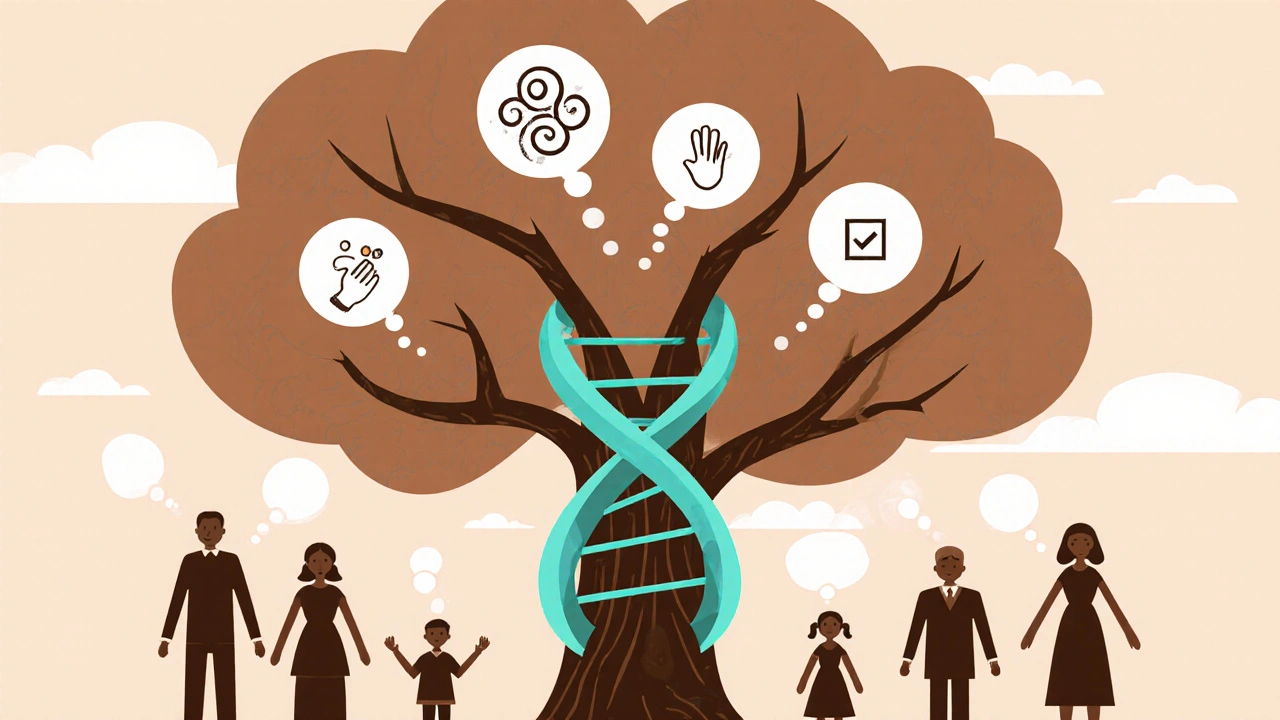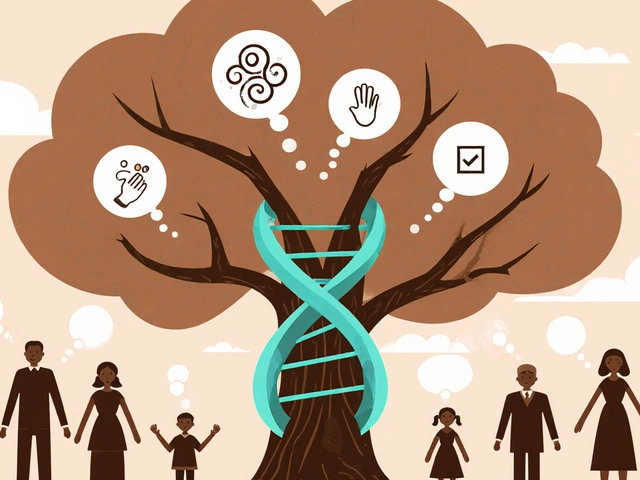When it comes to mental health, Obsessive‑Compulsive Disorder is a chronic condition marked by intrusive thoughts and repetitive behaviors that affect millions worldwide. Yet many people still wonder why some families seem to run the same pattern of compulsions across generations. The answer lies partly in Genetics the study of inherited DNA variations that influence how our bodies and brains develop. Understanding the genetic backdrop of OCD not only sheds light on why the disorder appears, it also opens doors to targeted therapies and better risk assessment.
Why genetics matter in OCD
Think of OCD as a puzzle. Some pieces are shaped by life events-stress, trauma, infections-while others are molded by the DNA we inherit. Research consistently shows that genetics account for roughly 40‑60% of the variance in OCD symptoms. That means if a close relative has OCD, your odds of developing it are significantly higher than for someone with no family history. This heritability figure comes from large‑scale twin studies comparisons between identical and fraternal twins to parse genetic vs. environmental contributions that have been running for decades.
Key findings from twin and family studies
Early twin work in the 1990s set the stage: identical twins (who share 100% of their DNA) displayed concordance rates of 35‑48%, while fraternal twins (sharing about 50%) hovered around 12‑18%. More recent meta‑analyses, pooling data from over 3,000 twin pairs, push the concordance for identical twins up to 55% for severe OCD. Family studies echo these numbers-siblings of someone with OCD are roughly three times more likely to develop the disorder themselves.
What the genome reveals: GWAS breakthroughs
The turning point came with genome‑wide association studies (GWAS) large‑scale scans of millions of genetic markers across the genome to pinpoint variants linked to a trait. In 2022, an international consortium analyzed DNA from 15,000 OCD cases and 30,000 controls, uncovering several risk loci that reached genome‑wide significance. While each individual variant adds only a modest increase in risk-often an odds ratio of 1.1 to 1.3-the cumulative effect across dozens of variants can be meaningful.
Major genes that keep popping up
Among the dozens of signal‑bearing regions, a handful of genes have shown consistent replication:
| Gene | Function | Reported Effect Size (OR) |
|---|---|---|
| SLC6A4 | Serotonin transporter, regulates serotonin reuptake | 1.15 |
| SLC1A1 | Glutamate transporter, modulates excitatory signaling | 1.20 |
| COMT | Catechol‑O‑methyltransferase, degrades dopamine | 1.12 |
| HTR2A | Serotonin receptor 2A, influences mood and cognition | 1.10 |
These genes all play roles in neurotransmitter pathways-serotonin, dopamine, and glutamate-that are already implicated in OCD’s neurobiology. The serotonin transporter gene (SLC6A4), for example, is the same gene that influences how people respond to selective serotonin reuptake inhibitors (SSRIs), a first‑line medication for OCD.
Beyond single genes: polygenic risk scores
Because each variant is modest, scientists now combine them into a polygenic risk score (PRS). Think of PRS as a genetic “weather forecast”: it doesn’t guarantee a storm, but it tells you the probability of rain. Recent work showed that individuals in the top 10% of OCD PRS have a three‑fold higher chance of diagnosis compared with those in the bottom decile. While PRS isn’t ready for clinical use-ethical and accuracy concerns remain-it provides a powerful research tool to explore gene‑environment interactions.
Epigenetics: how genes and experience intertwine
Genetic code is only part of the story. Epigenetics chemical modifications that turn genes on or off without changing the DNA sequence can bridge environmental triggers and genetic susceptibility. For instance, early‑life stress can add methyl groups to the promoter region of SLC1A1, dampening its expression and potentially heightening compulsive behaviors. Animal models support this link: mice with reduced SLC1A1 activity show exaggerated grooming-a behavior analogous to human compulsions.
How genetics informs treatment choices
Understanding a patient’s genetic profile might soon help clinicians personalize therapy. If a person carries a high‑risk SLC6A4 variant, they may respond better to higher doses of SSRI or to alternative agents like clomipramine. Conversely, carriers of SLC1A1 risk alleles could benefit from glutamate‑modulating drugs such as riluzole-research that’s already underway in phase‑II trials. Moreover, PRS could identify individuals who might profit from early‑intervention cognitive‑behavioral therapy (CBT) before symptoms become entrenched.

Common misconceptions about genetics and OCD
It’s easy to fall into a fatalistic mindset-thinking “my genes doom me to OCD forever.” The reality is far more nuanced. Genetic risk raises susceptibility, but it never acts in isolation. Lifestyle, trauma, infections (like streptococcal pANDAS), and even gut microbiota all modulate the final outcome. Also, having a family member with OCD doesn’t guarantee you’ll develop it; many people with a strong family history never experience clinically significant symptoms.
Practical steps for those concerned about genetic risk
- Know your family history. Write down who in your immediate and extended family has been diagnosed with OCD or related anxiety disorders.
- Seek early assessment. If you notice intrusive thoughts or ritualistic behaviors that interfere with daily life, talk to a mental‑health professional sooner rather than later.
- Consider genetic counseling. While routine genetic testing for OCD isn’t standard, a counselor can explain what current research means for you.
- Focus on modifiable factors. Stress‑management, regular sleep, and evidence‑based CBT can lower the chance that a genetic predisposition turns into a full‑blown disorder.
Looking ahead: the future of OCD genetics
The next decade promises richer data. Whole‑genome sequencing, larger multi‑ethnic GWAS, and integration of epigenomic maps will likely uncover new pathways-perhaps even ones we haven’t imagined yet. As these discoveries feed into machine‑learning models, clinicians may soon have decision‑support tools that combine PRS, symptom profiles, and environmental exposures to forecast a patient’s trajectory and suggest the most effective treatment mix.
Can a DNA test tell me if I will develop OCD?
No. Current genetic tests can estimate risk but cannot predict with certainty. Most people with risk variants never develop OCD, while some without known risk genes do.
Are there any FDA‑approved medications that target the genetic pathways of OCD?
Not specifically. Approved drugs like SSRIs act on serotonin pathways that overlap with some risk genes, but they were not designed based on genetic findings.
How does family history influence my child's risk for OCD?
If a first‑degree relative has OCD, the child's risk roughly triples compared with the general population. Early monitoring and intervention can mitigate this risk.
What role does epigenetics play in OCD?
Epigenetic changes can switch risk genes on or off in response to stress, infection, or trauma, shaping how likely a genetic predisposition becomes a disorder.
Should I consider genetic counseling if I have OCD?
Genetic counseling can help you understand family risk and discuss research options, but it isn’t required for treatment. Most clinicians focus on therapy and medication first.








Felix Chan October 19, 2025
Great overview! Genetics definitely adds another piece to the OCD puzzle, and it’s cool to see science moving forward.
Thokchom Imosana October 19, 2025
When you stare at the glossy headlines about GWAS, it’s easy to forget that the very same research pipelines were built upon a lattice of hidden funding streams that few dare to name. The 2022 consortium that you cite, for all its statistical power, was secretly seeded by corporations with a vested interest in neuro‑pharmaceutical patents. Those patents, in turn, lock away the most promising modulators of the glutamate system behind paywalls that only the elite can afford. By publishing risk loci like SLC1A4 and SLC6A4, the field conveniently paints a picture of inevitability while quietly silencing any dissenting voices that would question the methodology. Every twin study that reports a 55 % concordance in monozygotic pairs is built on a selection bias that excludes twins raised in low‑stress environments, skewing the heritability estimate upward. Moreover, the polygenic risk scores you mention are nothing more than a sophisticated form of genetic determinism that feeds into a surveillance‑economy model of mental health. The more we rely on PRS, the more we hand over personal data to data‑mining conglomerates that can predict our propensity for ‘disorder’ and market us a pill for it. Epigenetic findings, while intriguing, are being harvested by biotech firms that already have proprietary CRISPR platforms aimed at rewriting those methyl marks, turning a therapeutic hope into a commercial pipeline. In short, the genetics of OCD is not a neutral scientific story; it is a battleground where profit motives, regulatory capture, and academic prestige intersect. So before we celebrate the identification of SLC6A4 variants, we should ask who benefits from a society that labels millions as ‘genetically predisposed’ and then sells them a pharmaceutical fix. The answer, as always, is layered, and it begins with a skeptical eye on every grant, every press release, and every citation that avoids discussing the broader socioeconomic context.
ashanti barrett October 19, 2025
While the statistics are impressive, we shouldn’t forget that each number represents a real person battling intrusive thoughts every day, and that personal experience often reveals nuances that pure genetics can’t capture. The serotonin transporter SLC6A4, for instance, explains part of why SSRIs work for many, but it doesn’t explain why others respond better to cognitive‑behavioral therapy. Integrating genetic insight with individualized therapy plans is where the real progress lies, and clinicians should use these findings as a guide rather than a verdict.
Leo Chan October 19, 2025
Exactly! Think of genetics as a map, not a destiny. Even if you carry a handful of risk alleles, lifestyle choices, stress management, and early CBT can dramatically shift the trajectory. It’s amazing how much control we actually have when we combine science with proactive mental‑health habits.
jagdish soni October 19, 2025
Life’s tapestry weaves genes and fate together in a dance of shadows and light, yet we dare to parcel out causality with sterile tables and odds ratios. The very act of labeling a gene as ‘risk’ imposes a narrative that may limit the soul’s capacity to rewrite its own story
Latasha Becker October 19, 2025
The recent meta‑analytic aggregation of 3,000 twin pairs substantiates a heritability estimate approximating h²=0.48, which concordantly aligns with the polygenic liability threshold model posited in contemporary psychiatric genomics. Notwithstanding, the translational pipeline from identified loci such as COMT (rs4680) to pharmacodynamic modulation remains impeded by pleiotropic effects and epistatic interactions that are not yet elucidated in the current cohort studies.
Madhav Dasari October 19, 2025
Listen, the science is clear: genetics loads the gun, but environment pulls the trigger. If you’re aware of a familial pattern, use it as a catalytic force to seek early intervention-don’t let the odds become a self‑fulfilling prophecy. Harness the knowledge, pair it with evidence‑based CBT, and you’ll rewrite the script.
DHARMENDER BHATHAVAR October 19, 2025
The interplay between SLC1A1 methylation and early‑life stress underscores the necessity for epigenetic biomarkers in future diagnostic frameworks.
Kevin Sheehan October 19, 2025
Stop treating OCD like a genetic lottery and focus on real‑world treatment.